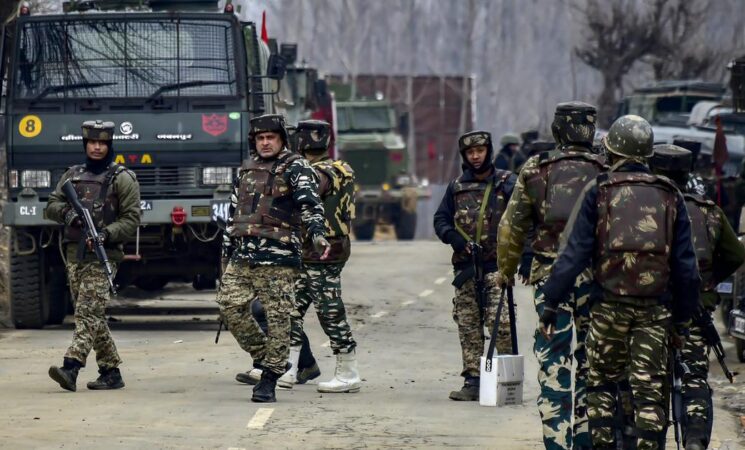25 February 2019, NIICE Commentary 2368
Dr. Aditi Paul
India, on 26 February 2019, conducted a ‘non-military preemptive’ strike on a training camp of Jaish-e-Mohammad (JeM) in Balakot, a prime location headed by Maulana Yousuf Azhar. In this operation, it was reported that many JeM terrorists, senior commanders, young trainees and other groups of jihadis were killed. This attack was in response to the 14 February 2019, incident when 40 Central Reserve Police Force personnel were shot during peacetime in the Pulwama District of Jammu and Kashmir by JeM. When India urged Pakistan to take up an action against JeM, Pakistan Prime Minister Imran Khan demanded proof from India and refused to take action against the terrorist group. Pakistan clearly overlooks the fact that both the base of the group and its leader, Masood Azhar, are residing in the state of Pakistan. In any case, providing proof makes no change in Pakistan’s stance because the progress on 26/11 Mumbai attack and Pathankot airbase attack are still awaited. In such a situation, an outright declaration of war by India became an answer.
Why Military Option Should Be Avoided?
Despite being in the troubled waters, war is not the most acceptable option for India. Constitutional provisions are in place but resorting to war needs proper planning and it will negatively impact the individual liberties of India. Besides, the kind of international relations the sovereign states are living under, a balance of power must be maintained. In South Asia, India, Pakistan and China are nuclear powers and borders with each other. In case of massive war strikes, the balance of power is dismantled and the damage is unimaginable.
From the economic standpoint, India is envisioning itself as a global economic player. India predicts economic growth through Goods and Services Tax (GST), which is touted as a growth enabler. Right now, India is in the threshold of attracting domestic and foreign investments. The country is also witnessing General Election in coming months. Hence, if India wages a war with Pakistan, it will impact India to a greater extent. The economic progress of India will have a setback for years to come because maximum resources meant for socio-economic development will be devoted to defence sector.
Lastly, explicitly declaring war by theIndian government will invite agitations and dismay from the minorities and chances are high that other political parties will make it a national issue to influence the upcoming election leading to the division in society.
Isolating Pakistan
Diplomatic measures and efforts needs to be taken to isolate Pakistan. India in the first 48 hours post-Pulwama attack held discussions with the P-5 states and had a dialogue with the West Asian states especially the ones which have steady trade relations with Pakistan. Around 50 nations have joined India in its quest to condemn Pakistan. Pakistan is already in the grey list and the Financial Action Task Force (FATF) is further pressurized by India to expose the terrorist links and backlist them. The US Ambassador expressed American government’s stand on this issue and criticized JeM. Other states like Israel assured India all kind of support when and where requires. Saudi Arabia and India had a joint declaration condemning the act. Saudi Arabia asked to de-escalate tensions by calling both the sides to reject terrorist infrastructure. Importantly, the United Nations (UN) asked them to taking strict actions against terrorist activities and adopt the UN Comprehensive Convention on International Terrorism. France along with the US and the UK pressurized the UN to list Masood Azar under global terrorist, a task that is constantly being veto-ed by China.
Along with diplomatic pressures, economic sanctions are also necessary in creating troubles for Pakistan, especially new, when Pakistan is economically in a vulnerable position. It is also an appropriate time for India to use its diplomatic missions to corner Pakistan by reaching the members of South Asian Association for Regional Cooperation (SAARC) countries, Shanghai Cooperation Organization (SCO), International Monetary Fund (IMF), Asian Development Bank (ABD) and others for putting economic restrictions on their trade agreements and financial assistance to Pakistan.
Pakistan is already in the state of bankruptcy and undergoing acute economic crisis, and it is desperately seeking funds to adjust its revenue deficit. It was appropriate decision that India withdrew the Most Favored Nation (MFN) status that it once gave to Pakistan and reestablished the agreement in 1996. The step was highly appreciated by all quarters because Pakistan never extended and neither intends to reciprocate with an MFN treatment for India. India is planning to increase the tariffs and custom duties on goods and services coming from Pakistan.
Conclusion
From the strategic point of view, war can be an option at present because India has right to self-defense. A response like the URI surgical strike and Balakot preemptive strike has been taken up by India for immediate security retaliation. However, India should come with a strong and concrete action plan to prevent such activities by bringing Pakistan on the table. India should also analyze the repercussions of military response and how it will impact its relations with the neighbours. In fact, India gained nothing from the Uri surgical strike, rather another attack in Pulawama by the terrorist groups based in Pakistan. Hence, using the same failed tactics is not in India’s best interest.
It is in India’s interest to de-escalate tensions and pressurize Pakistan through diplomatic channels to isolate them and impose economic sanctions until Pakistan takes necessary actions against their terrorists and guarantee that Pakistani soil will not be used by terrorist groups against India. India should adopt new measures and look for long term solution by consistently reaching to international community. It should not act in anger when crisis comes.


